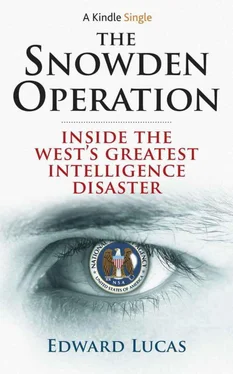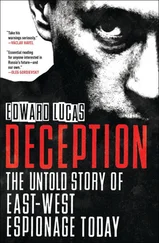Snowden did not do that, largely because no such serious problem, abuse or violation was taking place. As shown above, the NSA was acting within at least the letter of the law, under congressional and judicial oversight, in accordance with the instructions of an elected president. What Snowden claims as motivation was the trajectory—that a future government would abuse the collection programmes to create an Orwellian ‘surveillance state’ which individuals would be afraid to challenge for fear of drawing attention to themselves.
That is a political objection. So Snowden, even without disclosing classified information, could have approached the lawmakers, especially in the Senate, who have been publicly critical of what they see as the NSA’s excessive reach. He did not. He could have resigned from his job and applied for a job at one of the many think-tanks and campaigns which worry about privacy in the digital age. By providing stolen secrets he has certainly stimulated a far more intense public debate than mere assertions of an ex-employee would have done. But the quantity and quality of information stolen and published goes far beyond anything necessary to start a debate. It looks more like material for a global anti-American campaign.
Even without going through the legal channels available, Snowden could have made it easy for people to defend him as a genuine whistleblower. He could simply have taken and leaked the FISA court order showing that Verizon, the American mobile phone company, has to routinely hand over its customers’ phone records. [72] http://www.washingtonpost.com/world/national-security/verizon-providing-all-call-records-to-us-under-court-order/2013/06/05/98656606-ce47-11e2-8845-d970ccb04497_story.html
To be sure, this collection of meta-data is legal and the order was a routine renewal of a programme which has been going for years. But it was still shocking. People know that their phone companies can do this (and may be glad about it: it helps locate stolen mobile phones). They may be happy that police can analyse the data on a case-by-case basis—for example to find out who has been present at a crime scene. But there are reasonable grounds for worrying about a single government agency creating an automatic, perpetual, searchable warehouse for all such information.
A handful of other documents released by Snowden come into a similar category where a public interest defence would be plausible. If the NSA has indeed been deliberately promoting faulty encryption software, or tweaking industry standards, in order to make it easier to bug and snoop, that is a deplorable and flawed policy. A patriotic American might well try to spare the blushes of American companies who were put in an impossible position by a combination of warrants and gagging orders, while finding some material that illustrated the policy under which such measures were taken.
Had Snowden published such documents, he might well have been prosecuted. American criminal justice officials do take a literal and stern view of the law and (as I have pointed out above) this administration is particularly and deplorably heavy-handed when it comes to dealing with whistleblowers. But he would have had the strongest case for a public interest defence, or a pardon if convicted. He would have been able to say truthfully that he had sought to do the least possible damage to intelligence sources and methods, and to the economic interests of the United States, and had focused his disclosure on the secret aspect of the NSA’s activities which most Americans would find controversial. He could then have argued that any harm he did by breaching his oath of secrecy was outweighed by the public good. He might have faced prosecution and jail—but if he could prove that he had taken nothing else but a limited set of documents, whose publication was embarrassing but necessary and relevant, his defence, both in law and before public opinion, would have been stronger. But he didn’t.
In fact, his behaviour does not meet the most elementary tests for justifying whistleblowing. Rahul Sagar, a professor at Princeton, has defined these well in his new book Secrets and Leaks : [73] Secrets and Leaks: The Dilemma of State Secrecy (Princeton, 2013).
First, a whistleblower must have clear and convincing evidence of abuse. Second, releasing the information must not pose a disproportionate threat to public safety. Third, the information leaked must be as limited in scope and scale as possible. Snowden failed all three of these criteria. He has not shown systematic abuse, only secrecy and mistakes. He has harmed and weakened his country and its allies (indeed, for some Snowdenistas, this is a stated aim). He has stolen far more information than was necessary to make the case he purports to want to make. Why?
I have shown that the Snowden disclosures are heavily spun and damaging to American and allied interests in a way that goes far beyond the purported goals of promoting a debate about digital security. I have shown that this damage benefits Russia. I have shown that Snowden’s behaviour cannot be justified as whistleblowing. For these reasons alone, he and his allies deserve condemnation. But it is possible—though not proven—that something more sinister than mere naïveté and carelessness is afoot.
Chapter Five: Our Man in Hawaii
To see the suspicious features of the story, examine the facts, as far as they are known, about Snowden’s journey into and out of the world of intelligence. After incomplete formal education, he enlisted in the US Army but left after a few months—having broken his legs in an accident, he says. After joining the NSA as a security guard, he moved to Geneva to work for the CIA there, under the cover of an attaché at the American mission to the UN. This is a remarkably successful trajectory. Nobody has yet explained whether he displayed previously hidden talents, had served somewhere else to good effect, or benefited from powerful sponsors.
Some clues about his activities exist from posts he made on the Ars Technica website and in related chatrooms, under the pseudonym TheTrueHOOHA. [74] http://arstechnica.com/tech-policy/2013/06/exclusive-in-2009-ed-snowden-said-leakers-should-be-shot-then-he-became-one
His views seem muddled rather than treasonous. He wrote of surveillance: ‘we love that technology… helps us spy on our citizens better.’ He was furious with administration sources who leaked classified information to reporters: they ‘should be shot in the balls’, he wrote. But in February 2010 his views had changed. He wrote: ‘Did we get to where we are today via a slippery slope that was entirely within our control to stop, or was it an relatively instantaneous sea change that sneaked in undetected because of pervasive government secrecy?’
All this is odd (and not only because of his triple mixed metaphor). The CIA does not encourage its officers to spend time in online forums mulling the issues of the day or chatting about their private lives. The reason is simple: it is a beacon to the other side. Intelligence officers work on their targets with what is known in the trade as MICE—Money, Ideology, Coercion and Ego. Any sign of an erratic personal life, of ideological dissatisfaction, or of what psychologists call ‘cognitive dissonance’ offers an opening. If the target is unhappy, wanting to behave one way but forced to do something different, his mental stress can be exploited.
Russian intelligence keeps a close eye on the staff of adversary countries’ foreign missions. They are particularly interested in junior employees, trying to spot which are just officials and which are intelligence officers. So it is highly likely that the Russian intelligence rezidentura in Geneva would have noticed the arrival of the young Snowden and would have spotted his real job, working for the CIA. They also as a routine measure would have tried to see what he did in his free time. They would have tried to monitor his use of the internet on his unclassified home computer in the hope of seeing a weakness—drugs, online sex, gambling—which might be a potential avenue of approach. It is likely they would have identified him as TheTrueHOOHA and observed his patchy work record, his erratic private behaviour, and his voluble and increasingly dissatisfied stance online. According to John Schindler, the former NSA analyst and specialist in counter-intelligence, Snowden would have presented the perfect target to the Russians: ‘intelligent, highly naïve and totally uninformed’. [75] Interview with the author.
Читать дальше












